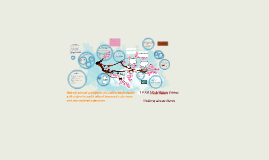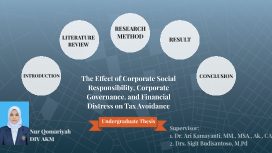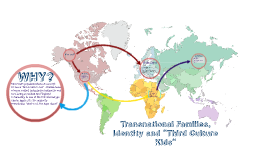Undergraduate thesis
Transcript: Focus on definition by Christopher Earley and Elaine Mosakowski (2009) Three dimensions cognitive CQ: “head” – awareness, self-awareness, knowledge motivational/emotional CQ: “heart” – perseverance, goal settings behavioral/physical CQ: “action” – adjust behaviors to cultural environment. H3b: Positive association between CQ and MTW weakens with IE H4a: CQ is positively associated with student’s learning satisfaction H4b: CQ is positively associated with student’s future employability H4c: CQ is positively associated with student’s academic achievement CQ as the ultimate outcome of intercultural occurrences Constructs of CQ should be more investigated to measure students’ learning satisfaction CQ training and education is important to improve students’ academic achievement Complexity of IE, MTW and CQ in the same context Research on the role of geographical positions on CQ influences. Consider MTW in attitude instead of involvement frequency (50% frequent, others experience) Select 3 dimensions instead of 4 in the construct of CQ 30% in total have intention to find a job -. Context not appropriate for future employment Subjective issues of online questionnaire might be biased Reference list Available upon request GPA Employability Learning satisfaction MTW can provide companies with significant gains in productivity. MTW’s members are expected to embrace cultural knowledge. Cross cultural group and team offer chances to gain CQ Cultural diversity in team: the more they adapt, the more competent they are. Implication for future research Conclusion The essence of cultural intelligence in the globalization era. What is cultural intelligence – CQ? APU – international institution – appropriate for developing CQ. The relationship between CQ and performance thanks to the influence of IE and MTW. Previous researches studied about these associations in the context of organizations and corporates Important to develop global talent or leadership IE can be fully utilized to develop CQ: positive effects on CQ IE: living in another country more than 6 months, even traveling to a new country. Positive association between CQ and IE, MTW MTW increases CQ overtime, important source of CQ development. CQ affects MTW as well High CQ in team members accelerates team integration, promote team cohesion, foster global identity CQ people will gain more from IE and exposure to culturally diverse settings H4b not wholly supported Student's performance H3b supported Limitation People with IE: more open minded, knowledge about culture benefits when participating in MTW skills to communicate, work in unfamiliar backgrounds H3: IE and MTW jointly influence CQ MTW and IE are predictors for CQ, can serve as substitutes in strengthening CQ level Positive association between CQ factors and students’ academic achievement Cognitive CQ and physical CQ predicts degree of learning satisfaction Emotional CQ and physical CQ relates to future employability for undergraduates Strongly expected that students are eager to intensify their skills in MTW, flourish in their IE to build on their CQ then flashing prospects in prevailing globalization scenario. Outline Implication and limitation H1, H2, H4c are supported. Testing H3, H3a, H3b: Smart PLS is used to find the association among three factors: IE, MTW, CQ CQ predicts performance and adjustment outcomes in multicultural situations (Ang, 2007) CQ is important to elements of success, including career success. Introduction DANG Minh Huyen (Anne) Undergraduate thesis Multicultural teamwork Cultural intelligence International Multicultural teamwork Experience H3a not supported Empirically examine the role of CQ with performance outcomes in relations with IE and MTW. H3a: Positive association between CQ and MTW strengthens with IE H2: Positive association between IE and CI Research purpose H4: CQ has positive association with students’ performance outcomes. CQ strengthens when IE serves as a substitute with MTW Strong association between CQ and students’ academic achievement (GPA) Cognitive CQ, physical CQ affect students’ learning satisfaction. Emotional CQ and physical CQ are important in job hunting activities. Questionnaire: 107 APU students from 16 nations. Response rate: high (94%) Measure 4 factors: IE, MTW, CQ and students’ performance. IE: countries they live, travel. MTW: the frequency of experience, attitudes toward teamwork activities CQ: measured by 12-questions set by Earley and Mosakowski regarding three dimensions. Students’ performance: GPA, number of job offers, the level of learning satisfaction. Smart PLS, Excel used to analyze data. Role of cultural intelligence on student performance with respect to multicultural teamwork experience and international experience. Cognitive Physical Emotional H4a not wholly supported Hypotheses testing Correlation between CQ with IE and MTW Student performance General result Discussion Introduction Theoretical background & hypothesis development

















